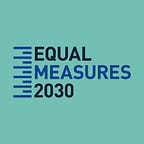Making gender about, for and by girls & women — reflections from Canada’s Feminist Learning Series
By Alison Holder, Director, Equal Measures 2030
For the Government with a Feminist Prime Minister and a Feminist Foreign Policy, a learning series that prompts discussion and shares best practices to promote gender equality and the empowerment of women and girls, naturally follows.
Equal Measures 2030 was proud to work with Global Affairs Canada (the department leading international development and humanitarian assistance for Canada) and representatives from Canadian civil society to present a Feminist Learning Series on “Using gender data to create transformative change” in April.
Over 100 representatives from the Government of Canada and civil society gathered to share their experience and ask questions about the importance of feminist approaches to data collection, sharing and use.
For me, gender data is far from being just data that is about girls and women. For a truly feminist approach to gender data, we must also talk about data that is for girls and women — made useful and accessible for gender equality advocates everywhere. And by girls and women, placing rights holders at the centre of this work.
To delve into this topic, I shared a panel with two leaders from Canadian civil society working in the gender data space — Jackie Hansen from Amnesty International Canada and Mayssam Zaaroura from Oxfam Canada. Together, we shared our organisation’s feminist approaches to data with examples from Canada, South Asia, and EM2030’s six focus countries.
For a truly feminist approach to gender data, we must also talk about data that is for and by girls and women, not just about them.
The starkest message I took away from the event is how common the gender data challenges and opportunities are for advocates, no matter the differences in their context. For Equal Measures 2030, our early work in our six focus countries has already indicated that gender equality advocates face major challenges in effectively accessing, understanding, using and rigorously collecting data to support their advocacy work.
We continually hear the frustration from advocates that the available data doesn’t reflect the lived realities of the girls and women in their communities. How can that be improved?
The starkest message I took away from the event was how common the gender data challenges and opportunities are for advocates, no matter the differences in their context.
Using data to leave no one behind — lessons from Amnesty International Canada
It was eye opening to hear Jackie reflect very similar messages when describing the data challenges related to gender-based violence against Indigenous women, girls and two-spirit people in Canada. There are indications that violence against these groups is actually increasing but it is impossible to say by how much because of inconsistent collection methods.
The SDGs are a universal agenda, applying equally to Canada as to low and middle-income countries. And it seems, so too are the gender data challenges. It was quite shocking to hear that there are inconsistencies in the way that Indigenous identities of crime victims are determined and reported.
The inability to use data to track how certain groups of girls and women are particularly affected by rights abuses is one that resonates for gender equality advocates globally. How can we ensure that the SDGs leave no one behind, if we don’t even have the basic data to understand which groups are worst affected and why?
Data to improve programme design and policy influencing — lessons from Oxfam Canada
Mayssam described the importance of data — and data being used — through Oxfam’s approach to creating a feminist learning system within a project cycle. She talked about work they are doing in six South Asian countries, where feminist evidence is contributing to a reduction in child and early forced marriage and violence against girls and women.
I took away three key points from Mayssam’s talk:
1. Ensuring that project knowledge “nuggets” (learnings) are used not just for programme design and quality, but also for broader policy influencing.
2. A feminist learning system ensures that those affected by the challenges addressed by the project are also involved in data collection and in using evidence to improve project design and to influence policies.
3. The process of being involved in data collection, data analysis and use is empowering and has transformative effects on the communities that are involved.
What next?
Through these examples, the common threads across our work were abundantly clear: gender data initiatives must be rooted in and centred on the rights holders themselves — nothing about us without us.
gender data initiatives must be rooted in and centred on the rights holders themselves — nothing about us without us.
Civil society data collection efforts can be an important catalyst for more systematic efforts by governments — but these must be supported with long-term core funding and with capacity strengthening to ensure that data collection efforts are rigorous and credible.
If we continue to prioritise feminist approaches to data collection, sharing and use — approaches where the data is about, for and by girls and women — we are better able to identify barriers and gaps, leading us to develop transformative programmes and policies that truly promote gender equality and empower girls and women to reach their full potential.
